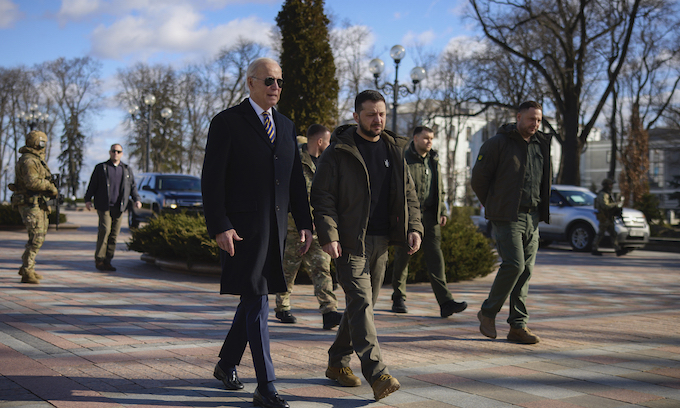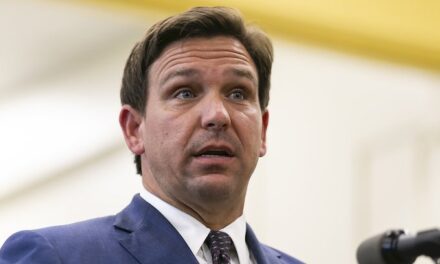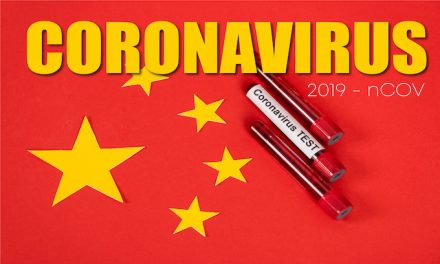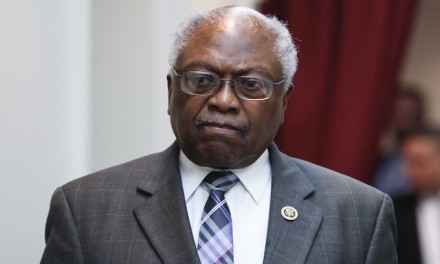The proposed $61 billion funding for Ukraine in a spending package fails to include corruption prevention and transparency measures, a group of GOP senators said during a discussion with Elon Musk and Vivek Ramaswamy ahead of a key procedural Senate vote on Monday night.
Sens. J.D. Vance (R-Ohio), Mike Lee (R-Utah), and Ron Johnson (R-Wis.) joined Mr. Musk and Mr. Ramaswamy to criticize funding Ukraine with no strategy to conclude the war.
The discussion took place on the X Spaces forum on the platform formerly known as Twitter before several Republican senators spoke on the floor late into Monday night.
The goal for the Senate Republicans is to kill the legislation before it goes any further, the lawmakers said. They urged listeners to contact their House members to demand they oppose the funding package.
Mr. Lee argued that the bill turns a “blind eye” to corruption in Ukraine.
“There is not, to my knowledge, anything in this bill that adequately deals with the issue of corruption [in Ukraine],” Mr. Lee said.
“The truth is, this thing still has about $8 billion going directly to the government of Ukraine,” he added.
“These are people who have really set world records for corruption. It’s an art form over there, apparently. That’s nothing denigrating against the Ukrainian people but their government does have a long history, and tradition, and practice of corruption,” he added.
The spending package ignores America’s security at the southern border to prioritize sending aid to Ukraine, Mr. Lee charged. He argued that this goes against a commitment Republicans made “to each other and to our voters and to our states.”
“By voting yes and passing this bill now, it empowers drug cartels, it dissolves our borders, it spends insane amounts of money that we don’t have on the priorities of foreign countries all at the same time,” he said, directing his criticism at fellow Republicans who support the bill.
Delaying Vote on ‘Blank Check’ Bill
The group of lawmakers raised questions about the bill’s efficacy and the rationale behind sending large sums of money without proper accountability.
“The assumption, as of a day ago, was the thing would certainly pass,” Mr. Vance said of the bill.
He explained the tactics his colleagues in the Senate were using to delay the vote as they drummed up support to kill the bill.
Mr. Vance said his colleagues in the Senate have “commandeered the floor of the Senate” by using procedural mechanisms to delay the vote in order to give the news media time to highlight key problems with the legislation and “gin up” House Republicans so they can prepare to “stop this thing.”
In a critical oversight, the bill does not articulate a strategy to end the war, according to Mr. Vance, who argued that it is essentially a “blank check for a strategy that has completely gone off the rails.”
Republicans gave away “a ton of leverage” to Democrats that they could have used to get “meaningful concessions” on the southern U.S. border, he added. “So the goal here is to kill this legislation in its infancy.”
In urging fellow Senate lawmakers to vote against the bill, Mr. Lee contended that killing the legislation in its early stages would equate to taking a stance against corruption in Ukraine.
He criticized the lack of provisions in the bill for an Inspector General specifically focused on monitoring corruption.
Mr. Lee confirmed that an amendment proposed by Sen. Rand Paul (R-Ky.) to include a special inspector general was denied and has not been brought back up in the latest round of amendments. He criticized the bill’s proponents for defeating it against the interests of American taxpayers.
Musk Questions Rationale
Mr. Musk, who noted his company’s support of Ukraine’s self defense efforts via SpaceX, questioned the rationale behind sending large sums of money to Ukraine “without any accounting of how the money is spent.”
Responding to Mr. Musk, Mr. Vance explained that lawmakers are facing a sort of “moral blackmail” to support sending more money to Ukraine.
“Here’s the basic argument,” Mr. Vance said. “It’s that we have to rush resources to Ukraine immediately, or they’re liable to fall to Russian aggression. It’s all basically an argument made under the gun that unless you approve this appropriation of resources and weapons, then you will allow Russia to win.
“It’s a kind of moral blackmail,” he added, under threat that you might be seen as wanting Mr. Putin to win.
Meanwhile, reports of corruption in Ukraine get “brushed under the rug,” Mr. Vance contended.
Another argument that proponents of the bill make, he said, is that the money sent to Ukraine is, in fact, properly accounted for. However, Mr. Vance expressed doubt about these claims.
“It doesn’t even pass the smell test,” he said. “And they‘ll admit to you that it’s a complete lie when you push them on it, but it becomes a sort of sunk-cost fallacy where these guys can’t admit that there is corruption. They can’t admit that there’s no strategy. They can’t admit that this isn’t going well because if they admitted that, it would cause too much psychological harm, and they’d have to cut bait.”
“Well, what about even retroactive examination?” Mr. Musk asked.
Mr. Vance responded, saying: “That’s where they fall back on the argument that the money’s already properly accounted for. And so it’s a bit of a logical Whack a Mole.”
‘Depraved Justification’
The conversation then shifted to the practicality of sending funds and the arguments by some on the Hill that the funding helps to build the U.S. industrial base and create jobs in America.
Mr. Johnson, adding his perspective, suggested that this is a “depraved justification.”
“One of the depraved justifications for all this spending is that it’s really not going over to Ukraine,” Mr. Johnson said. “It’s helping build our industrial base. And so it’s creating jobs in your state.
“I call that a depraved justification because that’s exactly what it is,” he added.
Mr. Johnson suggested that Russian President Vladimir Putin would not concede defeat in the war, and therefore the United States spending more money to support Ukraine without a clear strategy would only fuel a “bloody stalemate.”
“The only way this war ends is in a settlement,” he added. “And every day that the war goes on more Ukrainians, more Russian conscripts die. More civilians die.”
Musk Wary of a War of Attrition
Mr. Musk echoed Mr. Johnson’s concerns about the human cost of a prolonged war of attrition, in which one side wears down the other until they’re defeated. He also emphasized the need for a purpose in spending lives.
“My concern is exactly what you articulated,” he said, responding to Mr. Johnson. “If you have an extended war of attrition, every day that goes by, there are Ukrainian boys that are—and not even boys anymore because they’re running out of boys—that you’re losing Ukrainians, losing people, every day.
“And if you’re going to spend lives, that must be for a purpose,” he continued, adding that their lives can’t be spilled just to gain a mile of territory.
“The lines aren’t moving. So just every day, people die. For what purpose?” he added.
Independent 2024 presidential candidate Robert F. Kennedy, Jr., made similar criticisms of the push to continue funding Ukraine in a recent campaign post on X titled, “Here’s the truth about the war in Ukraine.”
In the video, Mr. Kennedy pointed to the interests and lobbying efforts of “big military contractors” who support additional countries joining NATO, so that their military equipment is required to conform to NATO weapons specifications, in turn, expanding their existing “trapped market.”
War Cannot Be Won
In the Spaces forum, Mr. Musk agreed with the senators that the war could not be won and that a peace deal would be in their best interest.
The billionaire founder of Tesla and SpaceX expressed his view that the bill’s passage wouldn’t lead to Mr. Putin’s defeat and raised questions about the potential consequences of regime change in Russia, noting that its new leader might be “even more hardcore” than Mr. Putin.
“There is no way in hell that Putin is going to lose,” said Mr. Musk, giving his two cents on the Russian leader’s perspective on the option of retreat.
“If he were to back off, he would be assassinated,” he added. “And for those who want regime change in Russia, they should think about who is the person that could take out Putin? And is that person likely to be a peacenik? Probably not. They’re probably gonna be … even more hardcore than Putin if they took him out.”
According to Mr. Ramaswamy, “endless funding” of Ukraine poses an unacceptable risk to the United States and its global interests. He called the growing alliance between Russia and China as “the single greatest increase for the risk of World War III that we’ve seen in the post-World War II era.”



















I’m all for sticking it to the Russians every chance we get, but not amenable to sending Ukraine $60 billion in cash that Joe’s crime family gets 10% kickback on. So send them military materials only, enough to blow Putin out of the Kremlin, or even cheaper, give them about 10 nukes back of the 2000 Ukraine surrendered back in the 90s under the condition that America, Russia, and Britain would guarantee their territorial sovereignty and integrity,,,that is before Obama turned a blind eye to them snatching the Crimea in 2014… No cash, just goods. Let the Europeans fund Joe under the table and fund Hunter’s Hooker happiness while the corrupt Ukrainian politicians get richer than King Midas or even richer on the American taxpayer dime than the Biden Crime family has. By sending them materials and not cash, at least the jobs to produce these goods stay in America, and it will be the Taxpayer that gets more than Joe’s 10% back in the form of American taxed corporate produced goods, with the American employees able to get income taxed on top of what the companies pay,,, not nothing taxed when the Chinese produce them and the American politicians get kicked back under the table what should have gone into our federal funding for more jobs/factories here in the USA.
I;d rather spend that on our OWN PEOPLE…
I can’t find text of the Senate foreign aid bill on web but Politico says most of 60 billion Ukraine aid will actually be spent on replenishing US military armaments that were depleted for Ukraine.
If true, then 60 billion is domestic military spending, not foreign aid to Ukraine which BTW has already received approx 100 billion from US with no demand or pressure for peace talks or negotiations with Russia in sight.
So exactly how much cash money would be going to Ukraine, what would it be for & when would they get it?
Quite a bizarre hypocritical contrast for US & EU to put no pressure on Ukraine to make peace with Russia, whose govt far as I know has not proclaimed its mission is to wipe Ukraine off the map & slaughter all Ukrainians everywhere.
On the other hand US & EU browbeat / threaten support for Israel if they don’t stop fighting the hordes of Islamist forces who have vowed never to be at peace with Israel or to stop killing Jews & threatening terror & death against everyone else, including US & EU, who offers support to Israel.
Much of the “aid” that goes to Ukraine ends up in two places – the pockets of the Ukrainian oligarchs and the pocket of the US military industrial complex. Thank you dumb rear end RINOs. And to totally ignore the southern border (and increasingly the northern border) crisis is despicable and criminal. The pockets of the RINOs probably got stuffed too.
That’s why i want to know the names of ALL INVOVLED..